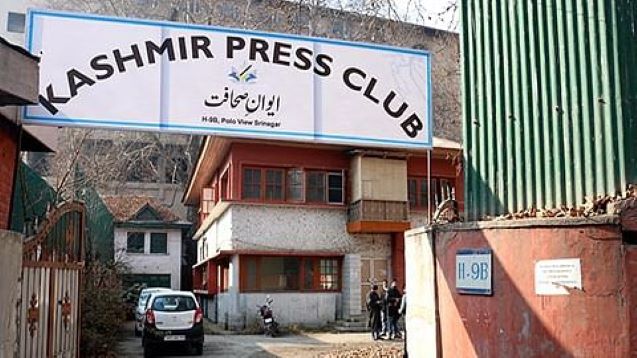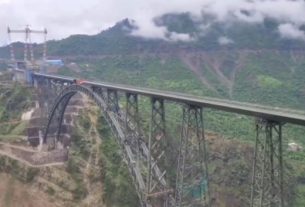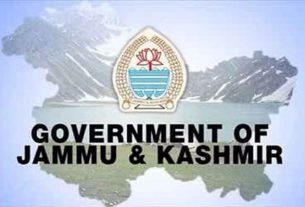Activists this week described the March 20 arrest of Kashmiri freelance journalist Irfan Mehraj for association with a Kashmir-based human rights group as another in a series of instances of Indian government punishment of journalists and activists who expose rights abuses in Indian-administered Kashmir.
Mehraj was arrested by India’s National Investigation Agency for his connection with Jammu Kashmir Coalition of Civil Society, or JKCCS, for which he provided research support. The organization, a federation of rights organizations and individuals in Indian-administered Kashmir, is being investigated as part of what is known as the “NGO terror funding case” — security agencies allege that several organizations have funded Kashmiri terrorist groups.
The group’s leader, Kashmiri rights activist Khurram Parvez, had been detained on terrorism-related charges since November 2021. He was formally arrested in the terror funding case March 22.
Mehraj worked for such Indian news portals as Article 14 and The Caravan magazine. He also contributed to international media outlets, including Deutsche Welle and Al Jazeera, apart from his work for the JKCCS.
“Investigation revealed that the JKCCS was funding terror activities in [Kashmir] valley and had also been in the propagation of secessionist agenda in the Valley under the garb of protection of human rights,” the NIA said in a statement after Mehraj’s arrest.
However, Mehraj’s arrest “for his principled articulations is grievous,” Angana Chatterji, a University of California at Berkeley scholar who has long worked on Kashmir human rights issues, said.
“The strategy of the Indian government to brand certain Kashmiri journalists and human rights defenders as agents of ‘terror’ is an assault on freedom of speech and seeks to effectively silence reportage on the egregious political violence and human rights abuses in Indian-administered Kashmir,” Chatterji told VOA.
The crackdown on journalists and rights activists has increased since August 2019, when the Hindu nationalist Bharatiya Janata Party-led national government unilaterally revoked the autonomy that Kashmir had had for 70 years, dissolved its government, and brought it fully under the control of the central Indian government.
In the past 3½ years, dozens of Kashmiri journalists have been summoned by the security agencies for background checks or to explain their stories, or their houses were raided. Some of them were arrested and jailed.
According to the Committee to Protect Journalists, four Kashmiri journalists, including Mehraj, are now in jail.
Dilbag Singh, director general of police for Jammu and Kashmir, did not respond to a WhatsApp request from the VOA for comment on the issue.
New Delhi-based senior BJP leader Alok Vats told VOA, however, that whatever security-related actions the government is taking in Kashmir are in the interest of peace and stability in the region.
“Under the garb of journalism and human rights activism, many secessionists and unlawful people are at work in Kashmir, in collaboration with the terrorist organizations. They are aiming to disrupt the region’s peace and stability, ” Vats said.
“The government is simply acting to stop those subversive activities. In this process suspects are arrested and questioned, to establish their links with terrorist organizations. Their arrest and interrogation in custody are fully justified.”
Several global media rights groups, including Reporters Without Borders, have condemned the arrest of Mehraj and sought his immediate release.
Daniel Bastard, head of the organization’s Asia-Pacific desk called Mehraj “an experienced, responsible and careful reporter who has no place being in prison.”
“Special laws intended to combat terrorism should not be used to suppress the activities of journalists,” he said.
A Kashmir-based journalist said journalists and rights activists are being targeted by the government “primarily because they are exposing rights violations committed by the forces.”
“The government is punishing some journalists to send out a message to others that any journalist or human rights activist daring to expose rights violation in Kashmir would face punishment,” the journalist who did not want to be identified told VOA.
Meenakshi Ganguly, south Asia director of Human Rights Watch told VOA the Indian authorities need to uphold human rights protections in Kashmir instead of punishing activists and journalists that draw attention to problems.
“Arbitrary arrests of journalists under draconian counterterrorism laws only exposes the Indian government to allegations that it is repressive, discriminatory and authoritarian,” Ganguly said.
Mehraj’s arrest is “another indication of the erosion of rights and democracy in India” under Prime Minister Narendra Modi’s government, Rohit Chopra, an associate professor at Santa Clara University in the U.S., told VOA.
“Like all regimes that seek to consolidate power at the expense of rights, the Modi regime wishes to control the flow of information and censor stories of state repression and rights violations. Mehraj’s deep understanding of Kashmiri society and his record of work challenges the official narratives about Kashmir trotted out by the government,” Chopra said.
“Kashmir activists are likely being targeted for the same reason that they might bring to light rights violations, a crackdown on ordinary freedoms of Kashmiris, and the fact that all is not hunky-dory in Kashmir.”
With elections set for next year in India, “Modi is keen to project an image as a hypernationalist strong leader and immobilize any sources of criticism,” he added.
“This strategy had worked for the BJP and him in 2019, so we will likely see jingoistic chest-thumping and stronger state repression in India in the months to follow,” he said.__VOA News





